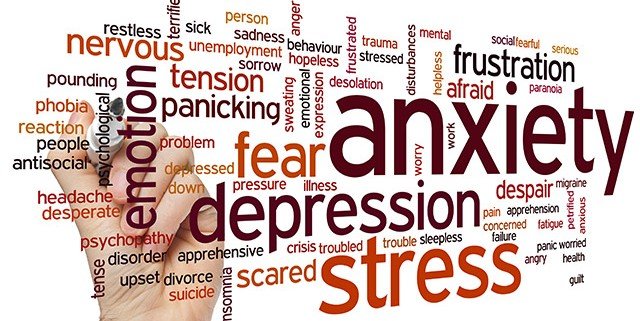Fear and Anxiety are basically natural alarming systems that aim at warning us of perceived threats and preparing our bodies for reacting. While Fear relates to direct, immediate and well-identified threats; Anxiety relates to probable, not immediate or poorly identified ones. Anxiety as an alarming system is vital to our well-being unless it went out of order. The inability to identify or properly deal with the underlying triggers keep the system on, which we tend to perceive as though it was the core problem and fighting it instead of listening to what it has to say.
When dealing with anxiety, ‘one solution fits all” perspective is inapplicable. Beside seeking professional help and trying different potential remedies, it would be of much help to identify the root causes of one’s anxiety.
Depending on my personal experience, experiences with others, and what I have read, I would like to share what I have learnt so far about anxiety triggers divided into four different approaches.

First approach: Forgotten, unresolved negative experiences.
Our primitive minds.
One of the primitive functions of our minds is to protect our physical and emotional well-being as well as our existence. To properly accomplish such a function, the mind puts much emphasis on negative experiences. A repetitive mild painful experience or a single extremely painful one is identified by the subconscious mind and stored for later use. When the tiniest hint of potential repetition of such experience is detected by the mind, it identifies it as a threat and triggers our fight or flight mood.
Training is storing information in the subconscious mind.
While we are learning a new skill, we need to be aware of every single action, with repetition we no longer need to be aware of our actions as the mind builds the neural network required to link and manage them. In other terms, the skill is literally being delegated to the subconscious mind. Remember how much concentration you needed to drive a car for the first few times, and how it had become a group of unconscious reflexes later.
In the same manner, for a quick and uninterrupted response, the mind sweeps old experiences along with the required stages of triggering fight or flight mood behind the curtains of the subconscious mind which makes it a tough task to identify the root cause of anxiety later. When a threat is detected, the required work is subconsciously done by the mind. we only become aware when we get anxious, which in terms of the subconscious mind is a call for action.
To this point, we are supposed to be aware of what triggers our anxiety, but most of the time we are not. While recorded in the subconscious mind, old experiences especially those we had at early childhood are usually forgotten.
Being a severe abuse, or a simple quarrel with a work colleague that ended in such a way we disliked but tended to bury and forget about altogether doesn’t mean that our subconscious minds had erased it. It would stay there, and as we forget about it, we can’t identify the root cause of our anxiety, it appears coming out of nowhere, so we can’t figure out what to do, and the action required by the subconscious mind is not being made, which in turn keeps communicating its warnings.
The subconscious mind can trigger anxiety over anything that it had identified earlier as a threat, no matter how serious it is. A threat can be an uncomfortable piece of clothes or a real life-threatening situation. It can be associated also with certain places, people, seasons or time of the day.
In some cases, we might not forget the experience, but it doesn’t occur to our minds to link it to anxiety. The experience might have been a mild one and our rational minds overlook the seemingly not serious, harmless, or irrelevant triggers.


Source
Second approach: lack of coherence with one’s self.
I believe this one has the most dominant and elusive kind of anxiety triggers.
In each society, family, workplace, group of friends, or even social media there are agreed upon personality ideals. The individual risks being rejected, made fun of, fall into isolation or oblivion if ever tried to challenge such ideals. If he is unluckier, he might be living in societies where he risks being imprisoned, beheaded, or publicly humiliated if ever dared to show parts of himself that defy social standards.
Aside from negative feedback, one gets when defying social standards, everyone needs to be successful in his career, loveable in his relationships and cared for in his family.
For such endeavours, many almost always need to wear masks, suppress some genuine aspects of themselves, or giving up their free will.
Wearing masks requires constant vigilance not to let them fall, which has its toll on the nervous system, that is why giving up masks is always accompanied with a sensation of relief. It gets rather complicated when the person forgets that he is wearing a mask and believing it is his real identity. He grows accustomed to the stress of hearing a mask and eventually lose tracks of it.
The genuine dreams, concerns, tendencies, emotions, or in the least personal opinions that one has entirely given up and forgotten about. All suppressed and forgotten aspects of himself leave him to an ambiguous sensation of something missing from his life, a feeling of un-wholeness, and emptiness within. The more he fails to fill that emptiness and restore his feeling of wholeness the more he becomes susceptible to anxiety.
We usually feel uncomfortable when start living against our nature. Because of external circumstances, we tend to ignore our inconvenience and push ourselves harder that we disengage from our deeper truth. imagine an introvert who is around a bunch of people, or an extroverted woman who live in a society where women are not allowed out of their houses, or generally, living around the wrong type of people, Later we grow accustomed to the way we live and see nothing wrong with it, while in reality, the discomfort is lying deep down within our souls trying to find its way out.
Sometimes, we are harsh on ourselves. Out of self-righteousness or for idealistic reasons, we set rules and standards for ourselves to follow. Sticking for a long while to specific standards or rules with no regard to how aligned they are with our real identities gradually brings about feelings of distress and anxiety.
The difficulty of this kind is that its triggers can’t be identified with rational thinking. To the conscious mind, there is nothing to worry about, and everything seems in place. Family members and friends can’t take you seriously as your life seems perfect from their perspective.
In the next post I will speak about the two remaining approaches....


As a follower of @followforupvotes this post has been randomly selected and upvoted! Enjoy your upvote and have a great day!
Thank You :)
Congratulations @alignment! You've got an upvote coming from the @ecotrain thanks to @eco-alex! This upvote is part of the Community Support Initative to help encourage you to keep writing great posts! Thank you for being a positive part of the Steem Blockchain!
Thank You :)